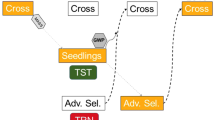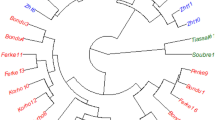Abstract
IN July 1949, Mr. J. E. Spickernell, provincial fruit specialist, East Midlands, discovered a variant in the M.40 clone of Royal Sovereign strawberry. In these plants the petiole hairs were adpressed upward, instead of spreading (that is, perpendicular to the petiole). In 757 plants of the same stock at this Research Station, 7.5 per cent were found to be of this variant form, and 1.1 per cent had both normal and variant crowns. In two plants some leaves with spreading hairs on one side of the petiole and adpressed ones on the other were found (see illustration), and in another, two consecutive runner plants on a single stolon had adpressed and spreading petiole hairs respectively.
This is a preview of subscription content, access via your institution
Access options
Subscribe to this journal
Receive 51 print issues and online access
$199.00 per year
only $3.90 per issue
Buy this article
- Purchase on Springer Link
- Instant access to full article PDF
Prices may be subject to local taxes which are calculated during checkout
Similar content being viewed by others
References
Darrow, G. M., J. Heredity, 17, 404 (1926).
Author information
Authors and Affiliations
Rights and permissions
About this article
Cite this article
ROGERS, W. A Chimera in the Cultivated Strawberry. Nature 165, 120–121 (1950). https://doi.org/10.1038/165120a0
Issue Date:
DOI: https://doi.org/10.1038/165120a0
Comments
By submitting a comment you agree to abide by our Terms and Community Guidelines. If you find something abusive or that does not comply with our terms or guidelines please flag it as inappropriate.



